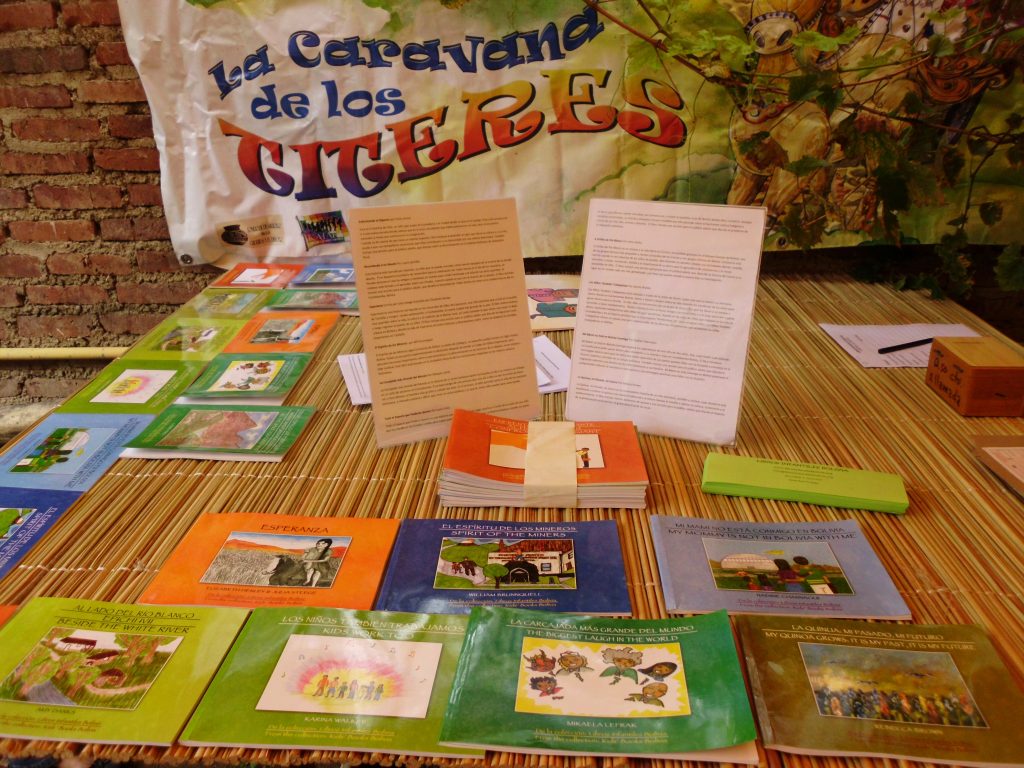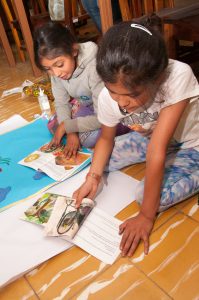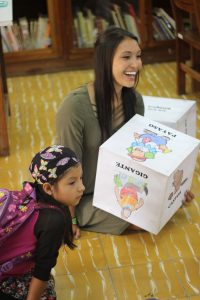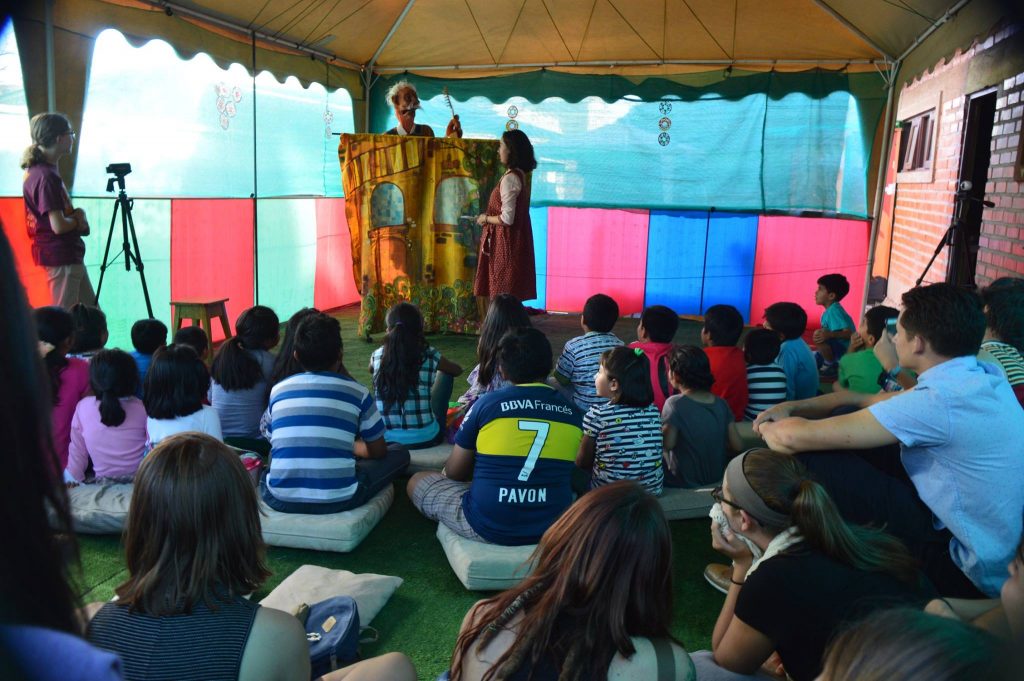G is for giving back: SIT students author books for children in Bolivia
September 24th, 2018 | SIT Study Abroad

By Amy McKeever
Ten years ago, children in Bolivia didn’t have many options if they wanted to read about their own country or cultural heritage. Children’s bookstores and libraries seemed to stock mainly translations of foreign titles like Cinderella rather than books written for Bolivian audiences.
“I was finding a lack of books that my kids could identify with in terms of their Bolivian identity,” says SIT Bolivia Academic Director Heidi Baer-Postigo, whose children are Bolivian-American.
Baer-Postigo was thrilled, then, when two SIT Study Abroad students approached her in 2008 with their idea to create children’s books about Bolivia for Bolivian children as part of their Independent Study Project (ISP). She immediately said yes, and the students spent the end of that semester researching, writing, and illustrating a story about their host mother’s childhood in rural Bolivia.
“They did very strenuous academic work but were able to condense it into something very accessible to non-academics,” Baer-Postigo says. “I think they found it a really rewarding process.”

Ever since, SIT Bolivia has offered all its study abroad students the same opportunity to explore Bolivia’s cultural heritage as part of a project known as Kids’ Books Bolivia. This collection of bilingual children’s books — which now comprises 38 titles with another five in development — includes everything from allegories about Bolivia’s political history to stories about its endangered animals. When SIT students complete their books, they present them not only in an academic setting but also in settings where they can read their work aloud to local children.
Last year, for example, SIT student Julius Figueroa wrote a book called The Honey Is Ours, which tells the story of Cochabamba’s Water War — a series of protests over the privatization over the municipal water system — through a family of bees. In the story, a queen bee overtakes a hive, overseeing the worker bees and keeping all the honey for herself. Over time, the bees realize their unjust situation and band together to force the queen bee to leave the hive. It is only then that they realize she had been a mosquito in disguise all along.
Kids’ Books Bolivia has proven to be a perfect fit for SIT’s Bolivia: Multiculturalism, Globalization, and Social Change program, which challenges students to examine cultural identity in Bolivia. Emphasizing the decolonization of education, the program encourages students to go beyond the so-called Ivory Tower of academia and instead find ways to engage with and support their host community.
“Students can come from the US, they can come from prestigious universities, they can do very academic work and research, but they really can be grounded in the reality of the communities that they’re learning about,” Baer-Postigo says. “I think this is what SIT stands for: really working to give back and have give-and-take relationships in the communities that we’re in.”

Over the years, Kids’ Books Bolivia has grown. In 2009, SIT Bolivia alumna Aliya Ellenby joined the project, creating educator toolkits suggesting activities that kids can do to explore and understand the research behind each book. Now Ellenby serves as the project coordinator, where her goal has been to share the books even more widely in the community by building partnerships with local libraries and organizations where SIT students can share their work. “It’s easy to discuss reciprocity, and it’s something else to see reciprocity in action,” Ellenby says. “I think it was important to me and to the project itself to see the books having an impact.”
The SIT program has already had an impact. Baer-Postigo says she sometimes gets requests from the community, asking if her students might be interested in writing about particular topics. These requests have resulted in a kids’ book about bats — thanks to a phone call from the principal researcher on bats in Latin America — as well as a book about adoption, which a local adoption agency told Baer-Postigo is a topic that had never been addressed in children’s literature. “To me, that’s the biggest form of reciprocity,” she says.
In December, Kids’ Books Bolivia gained another major partner: the Simon I. Patiño Libraries, run by the Simon I. Patiño Foundation’s Educational and Cultural Center. “They are the largest local institution with the largest library in Cochabamba,” Ellenby says. “I asked myself last semester, ‘Why haven’t we tried, I wonder what they would say?’ They immediately said, ‘Yes, let’s do this.’”

The Simon I. Patiño Libraries purchased 20 sets of books for each of their seven locations. But the organization’s involvement went even deeper: In the spring, Ellenby worked with local puppeteer Carmen Cardenas to create theatrical performances — using cardboard puppets and giant pop-up books — based on three of the titles written by SIT students. They traveled to all of the seven library locations to perform before audiences of anywhere from 80 to 150 kids, many of whom live in rural areas that don’t often get to host live performances.
Ellenby says partnerships like the one with the Simon I. Patiño Libraries will also help Kids’ Books Bolivia learn how to further enrich the reading experiences of local children and better serve its community in the future. But it’s also an exceptional experience for the SIT Study Abroad student authors, who find themselves connecting in a genuine and long-lasting way to their host community.
“As an educator and as a former SIT student, options like this really stand out because it gives the practical experience of things that one just can’t get only sitting in a classroom,” Ellenby says. “It’s a step into role of being a researcher, educator, and actor and making this practical, sensory, living experience.”
